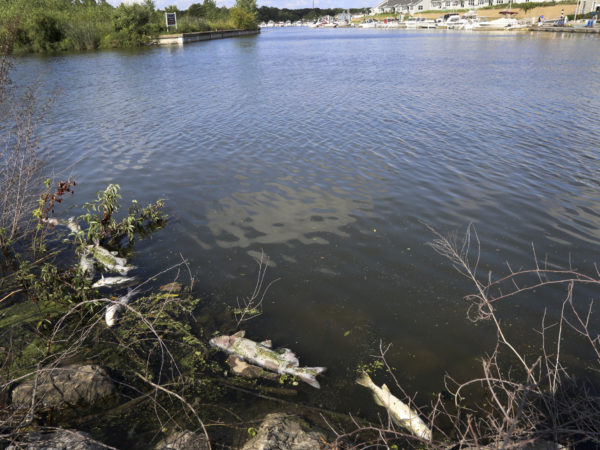
Michigan Democratic Sen. Debbie Stabenow and Rep. Dan Kildee introduced The Veterans Exposed to Toxic PFAS Act in July of 2023. Recently, Vice President Kamala Harris announced her support for the bill as a part of her presidential campaign. If passed, this would make it easier for veterans who were exposed to perfluoroalkyl and polyfluoroalkyl substances (PFAS) while serving to access medical benefits and disability.
“Today, there are more than 700 military sites with known or suspected PFAS contamination, including in Michigan,” said Rep. Kildee in a statement on October 23. “I applaud the Biden-Harris administration for acting earlier this year to set a drinking water standard for several types of PFAS chemicals. But the federal government, the Defense Department and private companies must act more quickly to address this growing and urgent public health threat.”
This comes on the heels of a letter sent to U.S. Department of Defense (DOD) inspector general Robert Storch by Michigan congressional leaders asking to add more oversight to the PFAS remediation efforts around military bases in the state. According to reporting by Teresa Homsi at WCMU, the U.S. Air Force recently revealed two cleanups in Oscoda will not be carried out for another five years. It has already been five years since Rep. Kildee first asked the DOD to look into their use of PFAS and the effects that these “forever chemicals” are having on military personnel, as well as the civilians living on or near military bases.
There’s another legal dispute between the Michigan Department of Environment, Great Lakes and Energy (EGLE) and the U.S. Air Force. According to Garrett Ellison of MLive, EGLE alleges the Air Force is moving ahead with a treatment system plan under the wrong state environmental law. Meanwhile, EGLE will be contacting residents near the industrial park in Haring Township, where 70 wells will be sampled for PFAS.
On October 9, Ohio Democratic Sen. Sherrod Brown also wrote to the DOD about the incineration method of PFAS remediation. Sen. Brown implored that this method be stopped, especially after the U.S. Environmental Protection Agency (EPA) deemed PFAS a hazardous substance.
“Researchers have shown that East Liverpool has measurable soil samples of PFAS due to the years of incineration that took place between 2019 and the start of DOD’s moratorium,” wrote Brown.
Pennsylvania Democratic Sen. Bob Casey recently announced that the Pennsylvania Infrastructure Investment Authority (PENNVEST) approved $149.7 million worth of projects that will go toward clean water infrastructure. Approximately $65.6 million of that will go toward specifically addressing PFAS and lead pipes.
Hastings, Minnesota, will finally receive help to treat PFAS in the city’s wells. All six of the wells have been found to have “forever chemicals” above the EPA’s new enforceable federal limits. The money will come from the state’s 2018 settlement with 3M.
Taking effect on January 1, 2025 the state of New York has banned all non-essential use of PFAS in apparel. According to the National Law Review, this includes undergarments, bodysuits, dancewear, dresses, leggings, leisurewear, formal wear, pants, shirts, skirts, suits, saris, scarves, tops, overalls, outdoor apparel, vests, onesies, bibs and diapers.
More PFAS news in case you missed it:
- Physicians Dr. Sharon Dodd and Dr. Lyndia Dernis co-wrote an op-ed for the Vancouver Sun urging the federal government of Canada to prioritize the health of their patients by restricting and phasing out PFAS in products. “With the proposed PFAS class listing under the Environmental Protection Act and negotiations for a global plastics treaty upcoming in November, this is a critical window for action,” they wrote.
- Teresa Carr wrote for Undark about what the upcoming U.S. election could mean for toxic chemical regulation, considering that the former Trump administration rolled back over 100 environmental regulations (according to a 2021 analysis by The New York Times).
- By 2025, PFAS will have to be removed from period products, like tampons and pads, in the state of California. On September 30, California Governor Gavin Newsom signed Assembly Bill 2515 into law, which requires that all “intentionally added PFAS” be removed.
- A new study out of North Carolina State University suggests that it could take up to 40 years to flush PFAS out of groundwater. Focusing on Cumberland and Bladen counties, the study combined “data on PFAS, groundwater age-dating tracers, and groundwater flux to forecast PFAS concentrations in groundwater discharging to tributaries of the Cape Fear River in North Carolina.”
- According to Newsweek, over 99% of bottled water samples from 15 countries were found to have two pervasive forms of PFAS, perfluorooctanoic acid and perfluorooctane sulfonate. In a study done by researchers at the University of Birmingham in the U.K. and the Southern University of Science and Technology in China, natural mineral water contained higher concentrations than purified water.
Catch more news at Great Lakes Now:
PFAS Roundup: Minnesota PFAS regulation said to be the strictest
Featured image: The former Wurtsmith Air Force base in Oscoda, Michigan is responsible for PFAS in groundwater in nearby communities. (Great Lakes Now Episode 1025)




